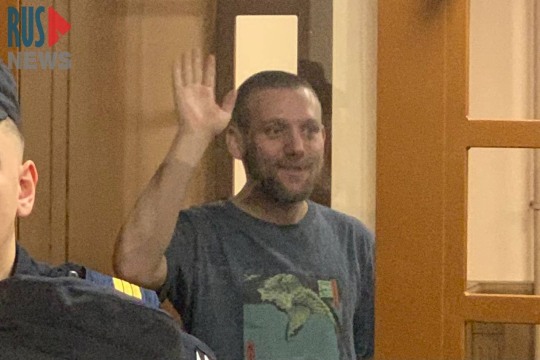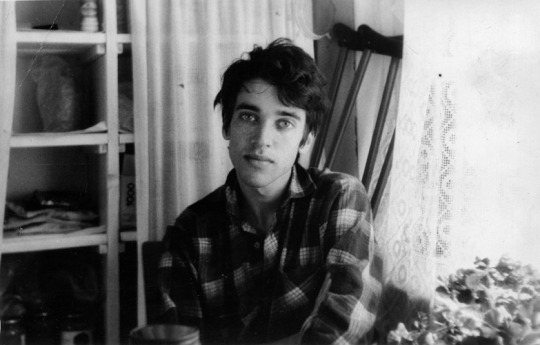#Grigori Dashevsky
Text
"Across the River They're Making Chocolate": Vsevolod Korolev's Closing Statement in Court
<Vsevolod Korolev
During his closing statement in court today the documentary filmmaker Vsevolod Korolev read a poem by Grigori Dashevsky:
1.
Across the river they’re making chocolate.
Out there the river-ice is breaking up.
And upriver we’re waiting, but for now
no bus comes, only its vacant ghost,
a desolate fleshless light flying ahead
to the engine’s howl
and the clatter of
the ad-slates…

View On WordPress
#Ainsley Morse#anti-"fake news" law#closing statement#Grigori Dashevsky#Irina Kravstova#Maria Ponomarenko#Russian anti-war movement#Russian invasion of Ukraine#Russian political prisoners#Sasha Skochilenko#Timmy Straw#Vsevolod Korolev
0 notes
Note
2 3 9 12 17
2. did you reread anything? what?
yeah. after all those years i can confirm that eugene onegin slaps as hard as it did when i first read it. i also turned to grigory dashevsky's and mikhail kuzmin's poetry collections quite a lot for sentimental reasons.
3. what were your top five books of the year?
in no particular order:
- imeni takogo-to by linor goralik
- leningradskaya khrestomatiya by oleg yuriev
- wound (rana) by oksana vasyakina
- chaadaevskoye delo by mikhail velizhev
- technically not just one book but andrey voznesensky's poetry. britney.gif
9. did you get into any new genres?
yes! i finally started to pay more attention to contemporary theatre and read a lot of plays.
12. any books that disappointed you?
too many for my liking. guess i was expecting a lot more from alexey salnikov and didn't enjoy his latest okkulttregger as a result. also viktor pelevin? is... not my kind of guy to put it mildly. though i'm now obsessed with the clay machine gun theatre production i recently saw in moscow.
17. did any books surprise you with how good they were?
you could say imeni takogo-to surprised me with how it made me feel. i.e. absolutely horrible. but i physically wasn't able to put it down.
#thank you dear anon#just realized i haven't read any foreign authors in 2022...#apart from the academic things i had to suffer through to finish my thesis
0 notes
Quote
Jacques Rancière's essay "Figures of History" makes many arguments that seem urgent for our times. He says, for example, that the artist's duty is to show "what can't be seen, what lies beneath the visible". This pleases me, because the late Russian poet Grigory Dashevsky always saw this as the role of poetry, to bring the invisible to the point of visibility. Rancière's most important point is this: in his writing about history, he contrasts 'document' with 'monument'. A 'document', for him, is any record of an event that aims to be exhaustive, to tell history, to make 'a memory official'. A 'monument' is the opposite of document ... "that which preserves memory through its very being ... a household object, a piece of fabric, a piece of pottery, a stele, a pattern painted on a chest or a contract between two people we know nothing about ..."
Maria Stepanova, from “In Memory of Memory” (translated by Sasha Dugdale) (Fitzcarraldo Editions, 2021)
#maria stepanova#sasha dugdale#jacques rancière#quotes#essays#words#found*#on time#history#on poetry
34 notes
·
View notes
Text
from Ithaca | Grigori Dashevsky
The night approaches. Dusk drafts on buildings
their future ruins. Dusk deepens windows
and apertures. It hollows stones
with shadows like with water. It foretells
the near death of a hundred clouds
to the shining host. A thin layer of dust,
the seer leaves his footprints on the roofs
as he walks home from the future
not his own, swallowing his voice —
in its rays, fat blood flows down
the golden armor. Wet
blue entrails. Large heads
have rolled down the shoulders.
Speech has grown silent in deep mouths.
……………………………………………..
The signs of a life without past will emerge
like lies through the lines of an old page,
emptiness will turn into loss,
foreign sand into Ithaca.
Ithaca is the time
when there’s nowhere to go. If it’s night,
it means the night is the end of the voyage.
A sackcloth hiding the shoulders
of the stranger is truer than
speeches about past and future
he won’t make. Nobody
will. On the streets rain readies
hollows for the funeral, already
overgrown with grass.
In a long puddle he sees:
a pauper, a random victim of the skies
hangs with his head down.
In height, he is a cloud, the size
of a lost faith
in returning home.
………………..
So should I, a pauper sitting
by a stranger’s door, declare: I’m Odysseus,
and I’m back. Should I say:
I’m recognized. After the mourning songs
tears are still rolling down my face. I have been
summoned to clothe the past
in the shining ice.
The twilight pushes a heavy box of reflection
out of the windows
and thumbs through a pale face
as if it were a stack of letters lying in a vacuum,
written by an unfamiliar hand.
You are in Ithaca, but you are not yet home.
The soul goes home the way of flesh,
clothed in white rags,
so that to say
upon arrival: I recognize
and I am recognized. Window water,
vapor of window reflections
harden not in the shining of the ice
that has come out of a secret thought,
but from a permanent neighboring frame,
which has embraced life into its shores of death,
where my steps on the sand
are uneven and filled with water.
Old rags are stronger than old life.
Night, like dead water, sows together
the tattered contours of the past.
A stranger’s death is a seed of your homeland,
sprouting from the graveyard statues,
from the clouds, forever still.
Grigori Dashevsky, ‘From “Ithaca”’ as published here. Translated from the Russian by Valzhyna Mort.
via mythic-substrata
0 notes
Quote
The soul goes home the way of flesh,
clothed in white rags,
so that to say
upon arrival: I recognize
and I am recognized.
Grigori Dashevsky, from "Ithaca," trans. Valzhyna Mort, Poetry (November 2014)
#grigori dashevsky#ithaca#poetry#lit#valzhyna mort#soul#spirit#body#homecoming#journey#death#odysseus#classics#mythology#*
280 notes
·
View notes
